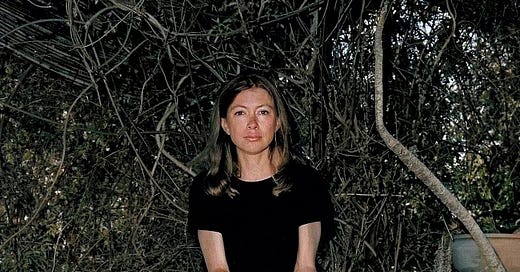“I’m not telling you to make the world better I’m just telling you to live in it. Not just to endure it, not just to suffer it, not just to pass through it, but to live in it. To look at it. To take chances. To make your own work and take pride in it." - Joan Didion
Something insidious happens as we get older: the little quirks and defenses we developed early in our lives start to… harden.
These are the techniques we used when young to overcome our fears and get along with the people we grew up around (including friends and parents).
They served us well when we were small and vulnerable. They allowed us to feel safe and accepted.
As we grow older, though, those defenses can calcify and cut us off from the world.
We can find ourselves, in Joan Didion’s words, “passing through” the world rather than living in it.
Not taking chances or sharing our authentic selves, but relying on old armour to keep us safe.
Missing the show.
As I write this, my five-year-old daughter is sitting beside me, “licking me” with one of her stuffed animals.
Her eyes are indescribable, but I’ll try: the irises are like the shining surface of a gas giant, hazel with flecks of green.
The presence of her — her weight beside me, the feel of her breath on my face — is miraculous. This being who didn’t exist six years ago, who’s been formed somehow from the raw material of myself and another.
Every detail of her physical self is incredibly unlikely. The delicate whorls of her ears. Two nostrils which (I swear) are heart-shaped when viewed from below. The hundred thousand hairs growing out of her scalp, each one in just the right place.
And yet, outside of writing this, how often do I notice her? Really notice? Appreciate the wonder of her being here, and loving me, and giving her stuffed animal a good lick at my face?
Love what’s there.
It doesn’t have to be a child or even a person.
How about the sky as it darkens toward night.
The smell of coffee and oranges in the morning.
The way the wind feels as spring takes hold and you’re walking home through a damp breeze, seeing the new buds bend with their branches.
None of these things is particularly rare or hard to come by. But we are mostly on autopilot, and fail to sense what’s there.
Trying not to lose the finer feelings.
When young, I felt things constantly. I noticed things constantly. I was awash in the delicious pain of being alive.
I remember writing poems about the purple evening sky in summer, seen through green leaves rendered bright orange by sodium streetlights.
I remember feeling as if the weather was doing what it did solely for my benefit, as if some force in the universe was putting on a show just for me.
Everything was invested with meaning and pregnant with promise. I had no idea what any of it meant, exactly, or what the promise was likely to turn into, but I was in love with everything and everyone.
I was probably pretty annoying, actually. But all of it made life feel important and worth living.
Nowadays, habit and fear and the reality of being an adult — a father, a husband, a “professional,” the owner (well, mortgagee) of a home — seems to have rendered all that feeling inaccessible.
My finer feelings, the ones that allowed me to come into regular contact with the mystery and magic of existence, and to connect with so many people, seem to have abandoned me.
Do what Joan says.
But it’s never too late. Never. There are even instructions available for finding your way back to those feelings.
Living in the world means the following, for Joan Didion: look at it; take chances; make your own work and take pride in it.
That sounds relatively simple and small when written out.
But each of those constructions has a lot in it. If we follow them all, we might find ourselves wildly alive again.
First, notice what’s happening. Who’s around you? What’s the weather doing? What do your sense of touch, sight, smell, taste, and hearing offer you? What’s going on inside your body and your mind?
Then, try to find what you most want right now. What you need and don’t yet have. The small, still voice inside you that’s been silent a long time, that would like to be heard. Can you take the chance of being seen as foolish for trying get what you really want? Are you willing to risk failure and shame? If you are, you might feel those things — but also so many other things…
And work: can you transmute the experience of the world you’re noticing and the desire you’ve managed to connect with into something worth sharing? Can you shape it into work that is authentic and conveys your experience in a way that others might touch it too?
Let’s stop just passing through the world, or enduring it, or suffering it. Let’s try to be here.
I’m not, most of the time, but those moments when I click back in and feel again are better than anything.
Joan did it. Maybe we can too.




